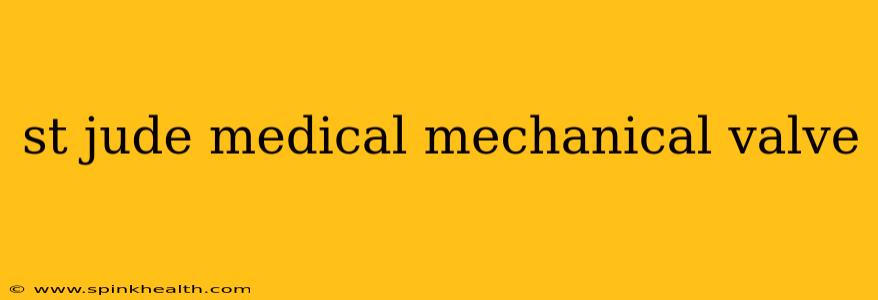The rhythmic thump-thump-thump of a healthy heart is something most of us take for granted. But for those whose hearts are failing, a mechanical heart valve, like those produced by St. Jude Medical (now part of Abbott), can be a lifeline. This comprehensive guide delves into the world of St. Jude Medical mechanical heart valves, exploring their functionality, durability, and the considerations surrounding their implantation.
Imagine a world where a tiny, meticulously engineered device can significantly extend a person's life and improve their quality of living. That's the reality for many recipients of St. Jude Medical mechanical heart valves. These valves, crafted from durable materials like pyrolytic carbon or metal alloys, replace damaged or diseased heart valves, restoring proper blood flow and revitalizing the cardiovascular system. Their precision engineering ensures they open and close with the necessary efficiency, mimicking the natural function of a healthy valve.
What are the different types of St. Jude Medical mechanical heart valves?
St. Jude Medical offered a range of mechanical heart valves, each designed to fit specific patient needs and anatomical considerations. While specific models may no longer be actively manufactured (as Abbott now handles production), the general categories remain relevant in understanding the technology:
-
Bileaflet Valves: These valves consist of two leaflets (or leaves) that open and close smoothly. This design often leads to improved hemodynamics (blood flow) compared to older, caged-ball designs. The reduced turbulence minimizes blood clot formation, a crucial factor in long-term success.
-
Single-disc Valves: While less common than bileaflet valves, single-disc designs also offered a robust and durable solution for valve replacement. Their simpler construction could contribute to ease of implantation in certain circumstances.
How long do St. Jude Medical mechanical heart valves last?
This is a question many patients and their families have. The lifespan of a St. Jude Medical mechanical heart valve is remarkably long, often exceeding 20 years. However, this isn't a guaranteed timeframe; individual results vary based on factors like patient health, adherence to medication regimens (particularly anticoagulants), and the presence of any underlying conditions. Regular check-ups with a cardiologist are vital for monitoring valve function and overall health.
What are the potential complications of St. Jude Medical mechanical heart valves?
While mechanical valves offer a significant benefit, it's crucial to acknowledge potential complications:
-
Blood clots: This is a primary concern. Anticoagulant medication (blood thinners) is essential to minimize the risk of clot formation, which can lead to stroke or other life-threatening events.
-
Valve wear and tear: Over time, mechanical valves can experience wear and tear, potentially affecting their function. Regular monitoring helps identify any issues early.
-
Bleeding: The anticoagulant therapy necessary to prevent blood clots increases the risk of bleeding.
-
Infections: As with any surgical procedure, there's a risk of infection at the implant site.
What are the advantages of St. Jude Medical mechanical heart valves?
Despite potential risks, mechanical heart valves offer several distinct advantages:
-
Durability: They are incredibly durable and have a much longer lifespan compared to bioprosthetic (tissue) valves.
-
Proven track record: These valves have been implanted in millions of patients worldwide, providing a wealth of data supporting their efficacy and safety.
What is the procedure for replacing a St. Jude Medical mechanical heart valve?
Replacing a damaged or worn-out mechanical valve is a significant surgical procedure typically requiring open-heart surgery. The specific procedure will depend on the individual patient's condition and the surgeon's assessment. The process generally involves replacing the existing valve with a new one, ensuring proper placement and functionality.
Do St. Jude Medical mechanical heart valves require anticoagulation therapy?
Yes. Anticoagulation therapy (blood thinners such as warfarin or newer oral anticoagulants) is absolutely essential for patients with St. Jude Medical mechanical heart valves. These medications prevent blood clot formation, a critical aspect of minimizing the risk of stroke and other serious complications. The dosage and type of anticoagulant will be determined by the cardiologist based on individual factors.
What is the recovery process after receiving a St. Jude Medical mechanical heart valve?
Recovery from mechanical heart valve replacement surgery is a gradual process. The initial recovery period involves hospitalization for monitoring and post-operative care. Following discharge, patients will need ongoing medical supervision, medication management, and regular follow-up appointments with their cardiologist. The length of recovery varies depending on individual circumstances.
This information is intended for general knowledge and should not be considered medical advice. Always consult with a qualified healthcare professional for personalized guidance regarding heart valve replacement and related health concerns. Remember, your heart health is invaluable, and proactive care is key to maintaining a long and healthy life.

